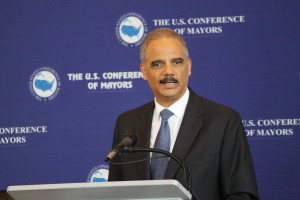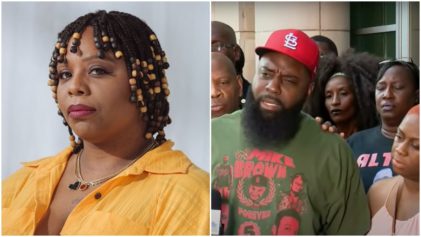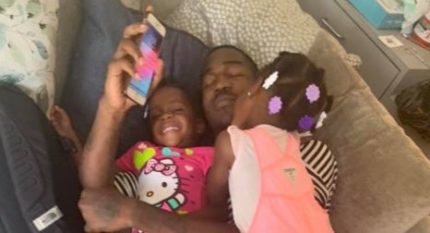
“In some places — despite the valiant efforts of elected leaders and public safety officials at every level — social ills like poverty, unemployment, and widespread lack of opportunity continue to trap people in lives of criminality and incarceration,” said Holder, who has made it a hallmark of his tenure as the nation’s top law enforcement official to speak out forcefully on behalf of communities of color. “And these conditions can give rise to tense and often tragic circumstances in which systemic violence can take root. This is something we saw all too clearly this past August, as the eyes of the nation turned to events in Ferguson, Missouri – where the shooting of an unarmed African-American teenager sparked widespread unrest and focused a national spotlight on the rifts that can develop between police officials and the citizens they are entrusted to protect.”
“The events in Ferguson reminded us that we cannot and we must not allow tensions, which are present in so many neighborhoods across America, to go unresolved,” Holder said.
There were 33 police chiefs and 38 mayors in attendance at the event — though Mayor James Knowles III of Ferguson and Thomas Jackson, the police chief of Ferguson, were not among them.
Holder said he pledged to the citizens of Ferguson when he traveled there after Brown’s death that his Justice Department would remain focused on dealing with the issues that led to the anger, “long after national headlines had faded.”
Holder called for a national review of police tactics and training, addressing his remarks to the dozens of mayors and police chiefs who had gathered at the William J. Clinton Presidential Center in Little Rock to discuss race relations and policing in the wake of Ferguson and during a summer in which the nation saw a seemingly incessant stream of violent incidents involving police attacking unarmed Black men.
“The Justice Department is working with major police associations to conduct a broad review of policing tactics, techniques and training,” Holder said, which is intended to “help the field swiftly confront emerging threats, better address persistent challenges, and thoroughly examine the latest tools and technologies to enhance the safety and the effectiveness of law enforcement.”
Holder said it was his wish that the review would evaluate policing and provide direction “on a scale not seen” since President Lyndon B. Johnson’s Commission on Law Enforcement was appointed in 1965.
As he noted the national reduction in the crime rate over the last two decades — and recently a reduction in the incarceration rate — Holder said part of the credit was due to former President Bill Clinton, who was on hand at the event. It was during the Clinton administration that the Justice Department introduced the Office of Community Oriented Policing Services (COPS), which has invested more than $14 billion over the last 20 years in community policing.
Holder said the COPS program has funded more than 126,000 officers who have served in nearly three-quarters of the nation’s law enforcement agencies, awarding approximately 39,000 grants to state, local, tribal and territorial law enforcement agencies and training to more than 700,000 law enforcement personnel, community members and government leaders.
The Justice Department announced two weeks ago that it was using nearly $124 million in new funding for the hiring and retention of 944 officers at 215 agencies and municipalities throughout America.
“These targeted investments will help to address acute needs – such as high rates of violent crime – by funding 75 percent of the salary and benefits of every newly hired or re-hired officer for three full years,” Holder said. “And the impact of this critical support will extend far beyond the creation and preservation of law enforcement jobs. It will strengthen relationships between these officers and the communities they serve, improve public safety and keep law enforcement officers on the beat.”
Holder quoted the Government Accountability Office, which in 2005 found that the COPS funding produced significant reductions not only in the overall crime rate, but in rates of violent crime and property crime
“I know everyone here has seen – in city after city – that community policing simply works,” he said. “Strong relationships, founded on mutual respect, can result in enhanced cooperation between local residents and law enforcement officials. And renewed trust in the fairness of criminal justice proceedings, even when citizens disagree with particular outcomes, can result in safer neighborhoods and closer engagement with community members in establishing clear expectations of compliance with the law.”
“This week, as we gather to confront these issues, to consider ways to rebuild trust where it has been eroded – and to redouble our commitment to the community policing strategies that lie at the heart of this important work – we’re taking robust and sweeping action to make good on that pledge,” he added.
The crowd heard from Clinton, who said the “tragedy of what happened in Ferguson” was a reminder of “a great challenge of the 21st century.”
“I think it’s important to remember that as long as we’re here on this earth, there will occasionally be bad things that happen,” Clinton said. “We know that if we have a situation where the law enforcement community and the government generally is inclusive and represents all elements of the community, we’re more likely to make good, decent decisions, and less likely to make big, bad mistakes.”
Noting the racial imbalance between the citizens of Ferguson and the elected officials and police, Clinton said, “The thing that struck me, reading all these heartbreaking stories, day after day, about Ferguson — we cannot afford not to know our neighbors. It doesn’t matter if they don’t vote the way we do.”
“There’s a basic mistrust of police departments” in many American cities, Clinton said. “We need to find a way to break down those barriers.”


